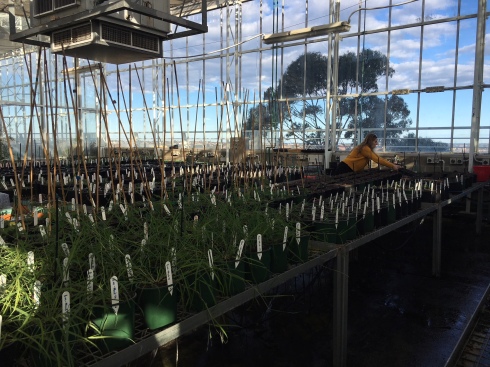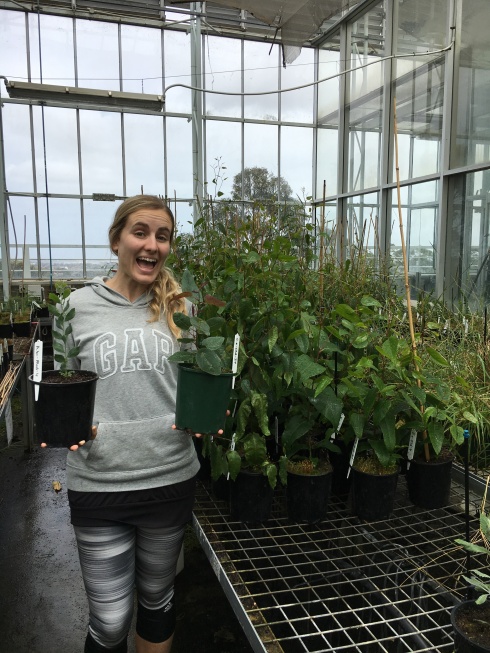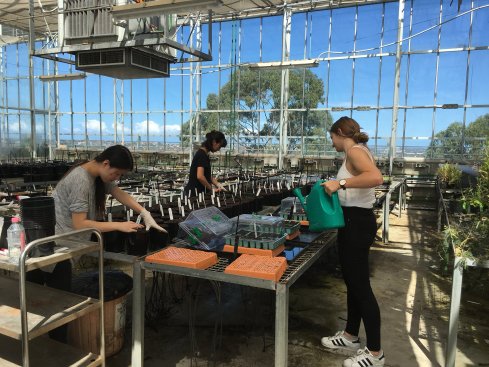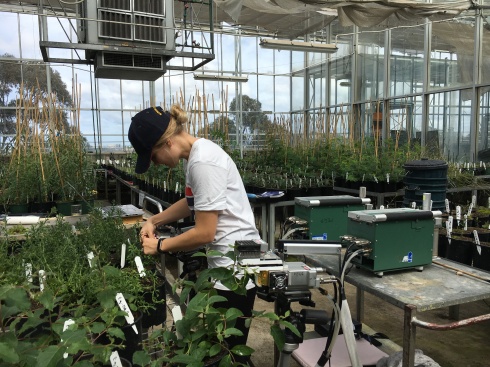It took months of planning, a season of fieldwork and a full year of glasshouse work to finish the first large scale experiment I have ever completed and the first experiment for my PhD thesis.
It was huge. I collected tens of thousands of seeds (and you can read about the fun part of collecting these seeds here), weighed and measured all of these seeds and then germinated hundreds of them on little agar dishes.


Once the seeds had germinated, I then transferred the tiny plants into pots of soil. This took ages. I had to mix thousands of litres of soil, pot thousands of pots and sow thousands of tiny plants. Massive shoutout to my volunteers at this stage.
I had created a powerful green army and spent most days of my #PhDlife tending to my plant children in the UNSW glasshouse.


Whilst all the plants were growing, each month I had to run around randomising all of the plants. I would move each plant individually around on the benches based on random lists I had created in order to control for different light exposures, temperature changes when benches were close to or far from the air conditioning and also any slight differences in sprinklers and the watering levels at each part of the bench. Again, it took myself and a team of volunteers many hours each month to keep up this process!

After six months of letting the plants grow I then measured 15 different plant traits on each plant (15 traits x 2500 plants = too many traits). This included measuring the height of the plants, the leaf area and leaf weight of the plants, how woody the stems of the plants were and I was also able to measure the photosynthetic rate of the plants using cool machines called Licor-6400’s.

It all had to come to an end, I harvested (cut down and dried out) all of the thousands of plants and weighed their stems, leaves and their roots. It was sad to kill all of the plants I had tended to for so long, but it felt so good to see the light at the end of the tunnel as the experiment was coming to an end.
By November 2018, I had finally finished! I celebrated with a long Gin and Tonic (the usual drink of choice in my plant ecology lab) and now I’m sifting through tonnes of data which is exciting but difficult and I’m also beginning to pull some manuscripts together from this experiment.
Maybe you’re a researcher or thinking of starting a PhD. So I thought I’d share some hints and tips I learnt from running a long term experiment with my readers:
- Create your team. I had a huge team of undergraduate volunteers, paid research assistants and my husband who was kindly pressured into helping his crazy/exhausted PhD student of a wife. This was the only way that I was able to complete the experiment in an adequate time frame rather than it taking the next ten years of my life. I had a good roster with these volunteers/staff and made sure not to push them past their limits. They also learnt a lot and have a cool project to add to their resumes.
- Organise. I had spreadsheets of the plants, a thorough lab book of observations and daily notes, checklists of measurements I had made and goals to complete and this all really helped me to stay on top of such a large scale experiment. Each day I knew exactly what I had already done and exactly what needed to be done. Not only did this help me stay organised, it also kept my spirits high as I broke each section of work down into smaller, manageable chunks. It always feels good ticking off achievements on a list!
- Be kind to yourself. I worked like a crazy person on this experiment and it became very physically and mentally draining (see this blog post for how I was feeling haha). I wanted to get my experiment done super fast and sometimes created unrealistic expectations for myself. It was good to step back some days and remind myself that I was doing fine, I had plenty of time and to worry less about everything being perfect all the time.
- Do big experiments during your honours or PhD. Many academics have told me how lucky I was to be doing such a fun and massive project. It was true! Once your postgraduate life ends, there isn’t a lot of time left to run big projects that you can call your own. Take these big opportunities, stretch yourself, and you may just come out with a really awesome data set that shows a lot about what’s going on in the world, and environment around us!
Suz this is absolutely incredible what you have done and achieved. This whole project is so interesting and I admire you so much for all your hard work and dedication.
Well done. You are amazing.
Marlene 🌸🌼🌸
LikeLike